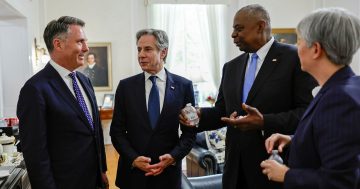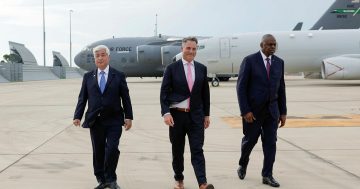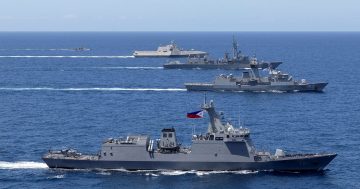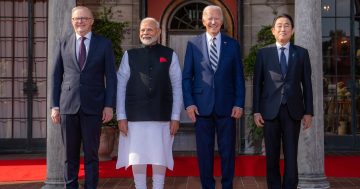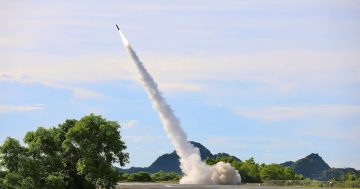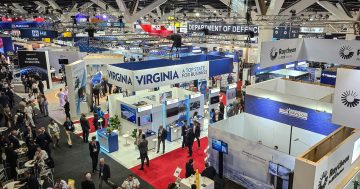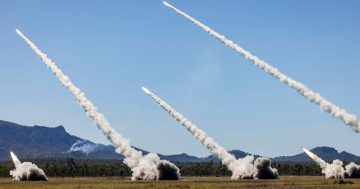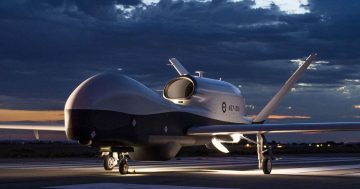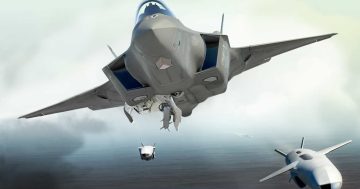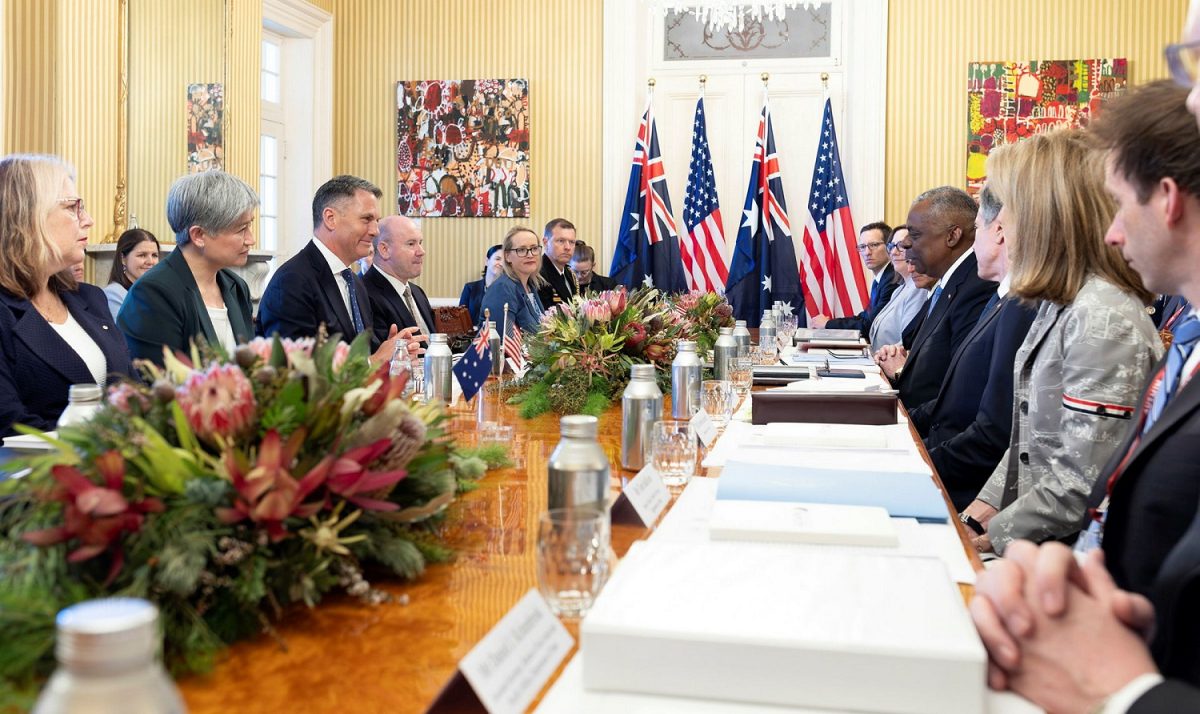
Officials from Australia and the US at the weekend’s AUSMIN talks in Brisbane. Photo: ADF.
Senior ministers from Australia and the United States met in Brisbane on the weekend for the 33rd iteration of the Australia-U.S. Ministerial Consultations (AUSMIN).
US Secretary of Defense Lloyd J. Austin and Secretary of State Antony Blinken met with their Australian counterparts, Deputy Prime Minister and Defence Minister Richard Marles and Minister of Foreign Affairs and Trade Penny Wong for the talks. AUSMIN coincided with the biennial Exercise Talisman Sabre, one of the largest multi-national exercises ever held in Australia.
The talks focussed on various geopolitical issues in the Indo-Pacific region and wider afield, including the Russian invasion of Ukraine, continuing unrest in Myanmar, China’s continuing flouting of international maritime law in the South China and East China seas, and North Korea’s growing belligerence against its neighbour and the wider region.
Also up for discussion was the US’s growing military presence in the region, including the forward deployment of US troops and equipment to Australia’s north. To that end, it was agreed RAAF bases Darwin and Tindal in the Northern Territory would continue to be upgraded to host deployed US military aircraft and personnel, while the possibility of upgrades at the ADF’s ‘bare bases’ of RAAF Scherger near Weipa in Queensland and RAAF Curtin near Derby in WA would be studied.
The meeting also reaffirmed the agreement under AUKUS Pillar I that US nuclear-powered submarines would conduct longer expeditionary visits to Australian ports – primarily HMAS Stirring near Fremantle in WA – from later this year.
A new item was the establishment of an interim combined logistics, sustainment, and maintenance enterprise hub at the Bandiana Barracks near Wodonga in Victoria, before a more permanent logistics support area was established in Queensland. These sites are expected to store ammunition, vehicle spares, and other equipment key to supporting forward-deployed forces.
The US will also start to regularly rotate US Army amphibious watercraft and US Navy maritime patrol aircraft through Australian bases to train with their Australian counterparts and “enhance regional maritime domain awareness”.
The talks also resulted in an intent to declare an Enhanced Space Cooperation as a new Force Posture Initiative which would increase integration and cooperation. While short on detail, it is expected this will include greater sharing of space domain awareness (SDA) data for tracking satellites and debris in orbit, and possibly the development of space and ground-based electronic warfare capabilities.
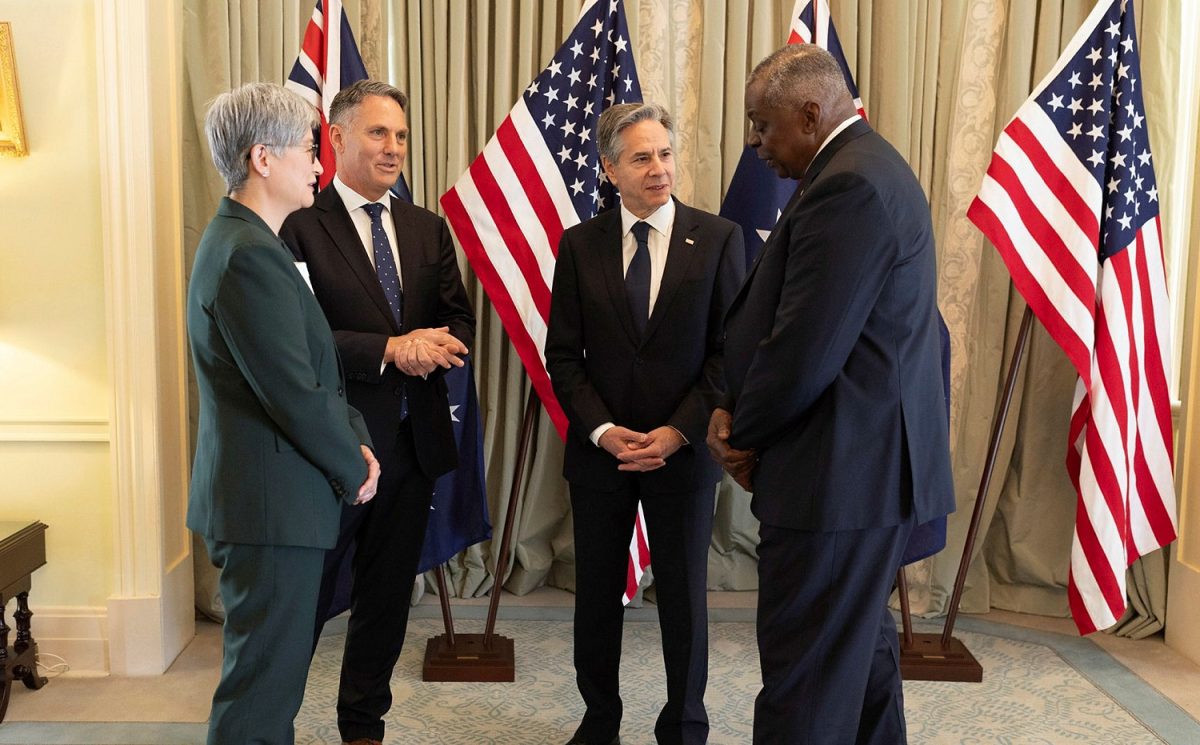
Australia’s Foreign Minister Penny Wong and Deputy Prime Minister Richard Marles, with US secretary of State Antony Blinken and Defence Secretary Lloyd J. Austin III. Photo: ADF.
One of the big-ticket items to come from the talks was an agreement for Australia to manufacture Guided Multiple Launch Rocket System (GMLRS) rounds, fired by M142 HIMARS long-range missile launchers. Australia is obligated to acquire HIMARS through its Project LAND 8113 requirement, and has stated a desire to establish its own manufacturing capabilities under the Guided Weapons and Explosive Ordnance (GWEO) Enterprise.
The meetings also reaffirmed Australia’s desire under GWEO to bring the maintenance, repair, overhaul, and upgrade (MRO&U) of priority munitions onshore, with an initial agreement on the Navy’s MK-48 heavyweight torpedoes and ship-launched SM-2 air defence missiles.
More broadly, the meetings undertook to enhance cooperation in the development of integrated air and missile defence (IAMD) systems with Japan, and to explore opportunities to deepen defence cooperation with regional partners including Japan, India, Indonesia, Philippines and South Korea.
The partners reaffirmed their commitment to expand collaboration to ensure an Indo-Pacific that was open, stable, peaceful, prosperous, and respectful of sovereignty, human rights and international law through economic, social development, climate change cooperation, humanitarian and disaster relief, security, health, and other measures.
Referring primarily to the South China and East China seas and the Straits of Taiwan, the partners said they valued the United Nations Convention on the Law of the Sea (UNCLAWS), including freedom of navigation and overflight and rights to manage and develop marine resources.
The talks also further reiterated the strong opposition to “destabilising actions in the South China Sea”, including “unsafe encounters at sea and in the air, the militarisation of disputed features, the dangerous use of coast guard vessels and maritime militia, and efforts to disrupt other countries’ offshore resource development”.
In the cyber domain, the principals reiterated their “shared concerns about the increased scale and severity of malicious cyber activity”, and “committed to hold to account those that engage in unacceptable behaviour in cyberspace”.
To this end, they expressed their support for the UN Open Ended Working Group and the UN Programme of Action to advance responsible state behaviour in cyberspace and protect an open, secure, stable, accessible and peaceful cyberspace founded upon international law and norms.
The US will host the next round of AUSMIN talks in 2024.
Original Article published by Andrew McLaughlin on Riotact.


